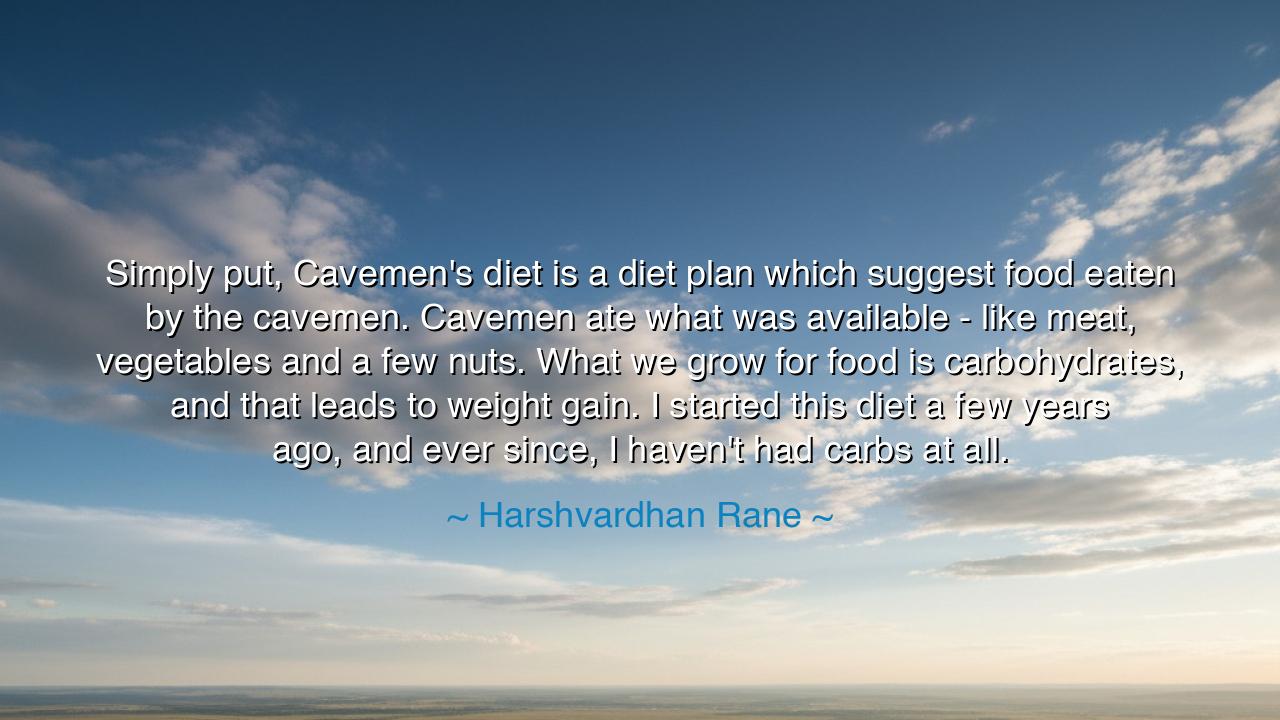
Simply put, Cavemen's diet is a diet plan which suggest food
Simply put, Cavemen's diet is a diet plan which suggest food eaten by the cavemen. Cavemen ate what was available - like meat, vegetables and a few nuts. What we grow for food is carbohydrates, and that leads to weight gain. I started this diet a few years ago, and ever since, I haven't had carbs at all.






In the words of Harshvardhan Rane, the actor and man of discipline, there echoes not merely a reflection on food but a meditation on the return to origins: “Simply put, Cavemen’s diet is a diet plan which suggests food eaten by the cavemen. Cavemen ate what was available—like meat, vegetables, and a few nuts. What we grow for food is carbohydrates, and that leads to weight gain. I started this diet a few years ago, and ever since, I haven’t had carbs at all.” Beneath this simple statement lies a call to remembrance—a summons to return to the natural order, to the primal wisdom of the earth, to the way of strength unspoiled by comfort. It is a voice that speaks not of deprivation, but of awakening—a voice that asks us to recall who we were before the softness of civilization dulled our instincts.
In his words, Rane invokes the spirit of the ancient hunter, whose life depended not on abundance but on awareness. The Caveman’s diet, as he names it, is not merely a plan of meals—it is a philosophy of life. It reminds us that our ancestors ate not from shelves, but from the soil and the wild. They ate what nature provided, not what industry produced. There was no sugar that never rotted, no bread that lasted weeks, no grains stripped of soul. Their strength was born from hunger, their health from harmony with the world around them. The modern man, by contrast, feasts yet grows weaker; he eats in plenty but starves of vitality.
The ancients, though they lacked our science, knew the balance of the body. In old Greece, the physician Hippocrates taught that food was medicine and that indulgence was poison. He warned that the sickness of men came not from scarcity but from excess. When the stomach was burdened beyond need, the spirit grew sluggish, and the mind clouded. So too does Rane echo this truth in his rejection of carbohydrates, not as an act of vanity but as a restoration of discipline. His abstinence is not denial—it is mastery. To refrain from what weakens is to strengthen both the flesh and the will.
Yet his message reaches beyond the body. To eat as the cavemen did is to live with intention—to take only what is needed, to give thanks for it, and to honor the simplicity of being alive. It is to cast away the illusions of plenty and remember the sacred hunger that built civilizations. The hunter who fasted before his chase, the warrior who ate to endure and not to indulge—these are our ancestors, and their wisdom calls us still. In them we find not savagery but clarity—the purity of those who lived close to nature, who knew that strength is born of restraint, not of comfort.
Consider the tale of the Samurai of Japan, whose diet was simple and deliberate: rice, fish, vegetables, and the rare taste of meat. They ate not for pleasure but for readiness, for they understood that a heavy body dulls the mind and slows the sword. Their mastery of battle was founded not in excess, but in harmony with the body’s rhythm. So too does Rane remind us that what we eat shapes what we become. In rejecting the indulgent carbohydrate, he rejects the laziness of modern life—the fog that settles upon the soul when one lives too easily.
The lesson in these words is as old as humanity: live in accordance with nature, and nature will reward you with strength. The food that grows fast often weakens fast; the food that must be hunted or gathered nourishes deeply. Seek the simplicity that our ancestors lived by. Eat what is real, what is clean, what demands gratitude. Do not eat merely for pleasure, for pleasure without purpose is a thief that steals the vigor of youth. Instead, eat with reverence, with awareness, as one who honors life itself.
And so, the wisdom of Harshvardhan Rane is not about diet alone—it is about discipline, mindfulness, and returning to the essence of being human. It is about remembering that our bodies were not forged in comfort but in challenge. The modern world feeds us endlessly, but the wise man learns when to stop. As the cavemen once did, we must listen to the body’s truest call—not of craving, but of need.
For in this return to simplicity lies the greatest strength. To eat as the caveman is to live as the awakened man—to move lightly, think clearly, and act decisively. The ancients would call this balance the harmony of nature and spirit, and it is there that life’s deepest power resides. Let this be the teaching passed down: eat simply, live purely, and guard your discipline as the sacred fire within.






AAdministratorAdministrator
Welcome, honored guests. Please leave a comment, we will respond soon